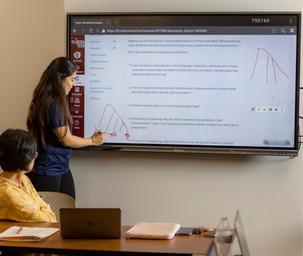Mathematics & Systems Engineering Research
Research in the Department of Mathematics and Systems Engineering focuses in areas of applied mathematics, operations research, systems engineering, and education.
Applied Mathematics
 Active areas of research in the mathematics program include nonlinear partial differential equations, potential theory, optimal control of systems with distributed parameters, inverse problems for PDEs, free boundary problems, mathematical modeling, neural networks, scientific computing and numerical analysis of nonlinear PDEs, mathematical biology, reaction-diffusion equations, variational methods for PDEs, critical point theory, mathematical physics, stochastic processes, queuing theory, dynamical systems, chaos theory, nonlocal PDEs, integral equations, and nonlinear wave equations.
Active areas of research in the mathematics program include nonlinear partial differential equations, potential theory, optimal control of systems with distributed parameters, inverse problems for PDEs, free boundary problems, mathematical modeling, neural networks, scientific computing and numerical analysis of nonlinear PDEs, mathematical biology, reaction-diffusion equations, variational methods for PDEs, critical point theory, mathematical physics, stochastic processes, queuing theory, dynamical systems, chaos theory, nonlocal PDEs, integral equations, and nonlinear wave equations.
Operations Research
Active areas of research in the operations research area include stochastic games, stochastic networks, stochastic programming, optimization and optimal control, mathematical finance, bioinformatics, data mining, biostatistics, image processing, signal processing, modeling of controlled queuing systems, decision making under uncertainty, modeling of complex biological systems, engineering management, quality control, applied graph theory and integer programming.
Systems Engineering
Model-based systems engineering (MBSE); complex, complicated and adaptive systems; intelligent systems and enterprise systems; contemporary modeling methods; decision, risk and optimization methodologies; system reliability; systems thinking and big data issues.
Mathematics & Science Education
Diverse research activities within mathematics education arise from student interest, are conducted in collaboration with student advisers and span the entire K-16 community. Research is guided by current research and related issues that emerge from within the mathematics education research community.
Research activities in science education vary across all major science disciplines including aeronautics, biology, chemistry, computer science, environmental and earth science, physics and psychology. Students are encourage to pursue research topics commensurate with their science background and teaching experience and represent the application of science to the K-16 education community.
Educational Technology

Research activities in the diverse and ever-expanding area of educational technology also spans the K-16 spectrum, including educational applications of AV resources to enrich traditional instruction, social media and simulation technologies including Virtual Reality (VR) to enhance learning within targeted audiences, and evolving technologies and strategies for improving the effectiveness of remote/distance and online learning.
National Environmental Literacy Assessment (NELA) Project
Funded by NOAA and EPA, and administered by NAAEE, the National Environmental Literacy Assessment (NELA) project was a 10-year, multi-phase research project to help determine how environmental education (EE) practices support the development of environmental literacy among middle-school students around the U.S. The NELA team supported national assessments (K-12) in South Korea, Israel, and Turkey, and later worked with members of each national team to summarize and compare results. After NELA, doctoral students at Florida Tech have developed instruments to assess environmental literacy among college students in Mainland China and high school students in Saudi Arabia. Other areas of research in environmental education include environmental sensitivity and significant life experiences.

 Give to Florida Tech
Give to Florida Tech 